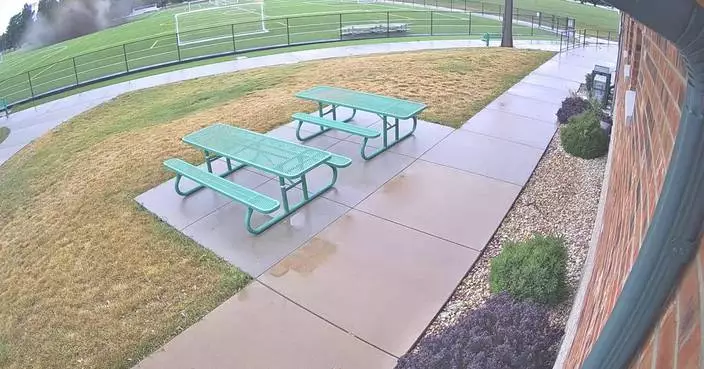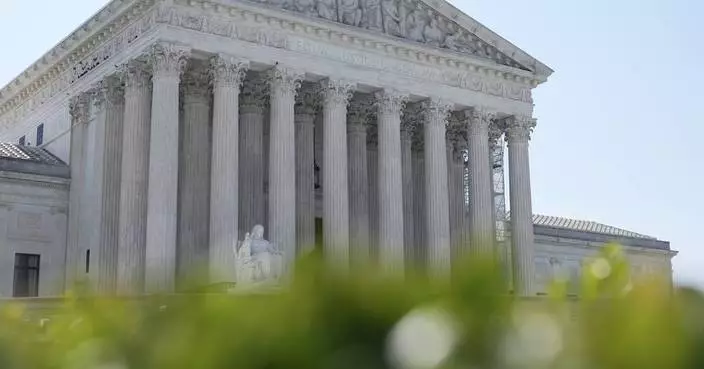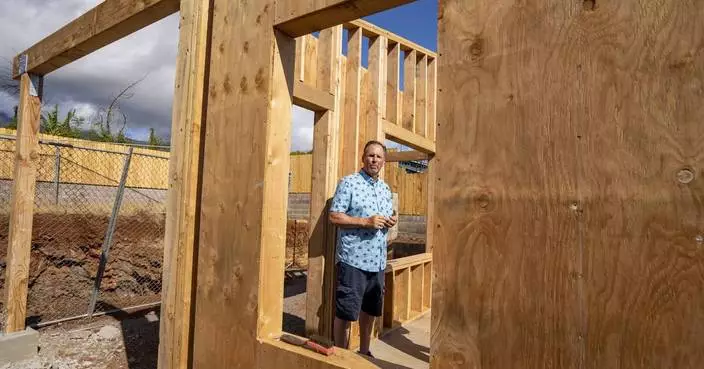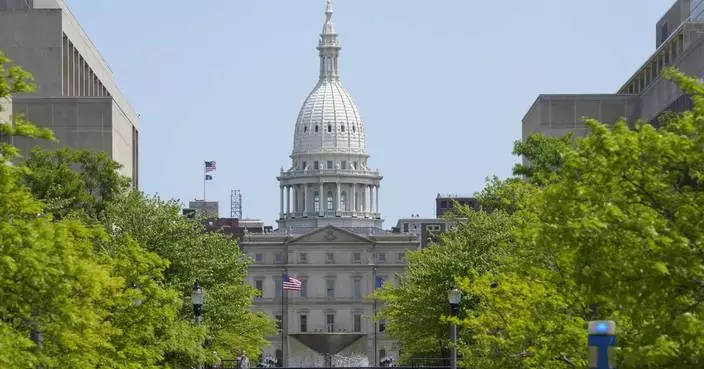JERUSALEM (AP) — Israeli Prime Minister Benjamin Netanyahu on Tuesday claimed the United States is withholding weapons and implied this was slowing Israel's offensive in the southern Gaza city of Rafah, where fighting has exacerbated the already dire humanitarian situation for Palestinians.
President Joe Biden has delayed delivering certain heavy bombs since May over concerns about Israel's killing of civilians in Gaza. Yet the administration has gone to lengths to avoid any suggestion that Israeli forces have crossed a red line in the deepening Rafah invasion, which would trigger a more sweeping ban on arms transfers.
Click to Gallery
JERUSALEM (AP) — Israeli Prime Minister Benjamin Netanyahu on Tuesday claimed the United States is withholding weapons and implied this was slowing Israel's offensive in the southern Gaza city of Rafah, where fighting has exacerbated the already dire humanitarian situation for Palestinians.
Palestinians mourn their relatives killed in the Israeli bombardment of the Gaza Strip in a hospital in Deir al Balah on Tuesday, June 18, 2024. (AP Photo/Abdel Kareem Hana)
Palestinians mourn their relatives killed in the Israeli bombardment of the Gaza Strip in a hospital in Deir al Balah on Tuesday, June 18, 2024. (AP Photo/Abdel Kareem Hana)
Israeli Prime Minister Benjamin Netanyahu speaks during a ceremony at the Nahalat Yitshak Cemetery in Tel Aviv, Israel, Tuesday, June 18, 2024. The ceremony marked the annual memorial for people killed in Israel’s Altalena affair -- a violent clash between rival Jewish forces that nearly pushed the newly independent Israel into civil war in 1948. (Shaul Golan/Pool Photo via AP)
A Palestinian woman mourns over the body of her nephew, Hamza Al Raei, 11, killed in the Israeli bombardment of the Gaza Strip in a hospital in Deir al Balah on Tuesday, June 18, 2024. (AP Photo/Abdel Kareem Hana)
People wave Israeli flags during a protest against Israeli Prime Minister Benjamin Netanyahu's government and demanding elections outside of the Knesset, Israel's parliament, in Jerusalem, Tuesday, June 18, 2024. (AP Photo/Leo Correa)
People wave Israeli flags and signs during a protest against Israeli Prime Minister Benjamin Netanyahu's government and demanding elections outside of the Knesset, Israel's parliament, in Jerusalem, Tuesday, June 18, 2024. (AP Photo/Leo Correa)
Israeli Prime Minister Benjamin Netanyahu speaks during a ceremony at the Nahalat Yitshak Cemetery in Tel Aviv, Israel, Tuesday, June 18, 2024. The ceremony marked the annual memorial for people killed in Israel’s Altalena affair -- a violent clash between rival Jewish forces that nearly pushed the newly independent Israel into civil war in 1948. (Shaul Golan/Pool Photo via AP)
Netanyahu, in a short video, spoke directly to the camera in English as he lobbed sharp criticisms at Biden over “bottlenecks” in arms transfers.
“It’s inconceivable that in the past few months, the administration has been withholding weapons and ammunitions to Israel,” Netanyahu said, adding, “Give us the tools and we’ll finish the job a lot faster.”
Netanyahu also claimed U.S. Secretary of State Antony Blinken, in a recent visit to Israel, said he was working around the clock to end the delays.
However, Blinken said Tuesday the only pause was related to those heavy bombs from May.
“We, as you know, are continuing to review one shipment that President Biden has talked about with regard to 2,000-pound bombs because of our concerns about their use in a densely populated area like Rafah,” Blinken said during a State Department news conference. “That remains under review. But everything else is moving as it normally would.”
Netanyahu didn’t elaborate on what weapons were being held back, and the Israeli military declined to respond to a request for comment. Ophir Falk, a foreign policy adviser to Netanyahu, deferred questions on details to the U.S. government.
Responding to Netanyahu's claim Tuesday, White House press secretary Karine Jean-Pierre said, “We generally do not know what he’s talking about. We just don’t."
She added that the U.S. is having “constructive discussions” with Israel about the paused shipment of heavy bombs and that it's the only transfer being delayed.
Two top Democrats in Congress cleared the way this week for a $15 billion U.S. sale of F-15s to Israel to move forward, after a delay while one lawmaker sought answers from the Biden administration on Israel’s current use of U.S. weapons in the war in Gaza.
With Israel's war against Hamas now in its ninth month, international criticism is growing over U.S. military and diplomatic support for the Israel's campaign of systematic destruction in Gaza, at a huge cost in civilian lives.
The top United Nations court has concluded there is a “plausible risk of genocide ” in Gaza — a charge Israel strongly denies. Israel blames civilian deaths on Hamas, saying militants operate among the population.
Both Netanyahu and Biden are balancing their own domestic political problems against the explosive Mideast situation, and the embattled Israeli leader has grown increasingly resistant to Biden’s public charm offensives and private pleading.
Experts say Netanyahu's message — delivered only in English — is likely meant to shore up U.S. arms support and doesn't appear to indicate on-the-ground shortages.
“I’m not worried,” said Itamar Yaar, a former deputy head of Israel’s National Security Council who leads of a group of former senior security officials. He thinks Netanyahu wants "to make it difficult for the Biden administration to delay arms supply in the future.”
Aviv Bushinsky, a former Netanyahu adviser, suggested the prime minister’s office is working to set the agenda for Defense Minister Yoav Gallant’s meetings in the U.S. next week while allowing Netanyahu — rather than Gallant — to claim credit for releasing the shipment of bombs. The video also sets up a speech Netanyahu is set to deliver to Congress in about a week, he said.
“It’s a very belligerent style of diplomacy, but he’s in a win-win situation," Bushinsky said. “He has nothing to lose at the moment — this serves him in all dimensions, internally, publicly.”
Netanyahu disbanded his war Cabinet on Monday, a move that consolidates his influence over the war and likely diminishes the odds of a cease-fire anytime soon. Critics accuse him of delaying an end to the war because it would mean an investigation into the government’s failures on Oct. 7 and raise the likelihood of new elections when the prime minister’s popularity is low. Netanyahu denies the allegations and says he is committed to destroying Hamas’ military and governing capabilities — no matter how long that may take.
Months of cease-fire talks have failed to find common ground between Hamas and Israeli leaders. Both Israel and Hamas have been reluctant to fully endorse a U.S.-backed plan that would return hostages, clear the way for an end to the war, and begin rebuilding the decimated territory.
Israel’s war against Hamas in Gaza has killed more than 37,100 people, according to Gaza’s Health Ministry, which does not distinguish between combatants and civilians in its count. The war has largely cut off the flow of food, medicine and other supplies to Palestinians who are facing widespread hunger.
Israel launched the war after Hamas’ Oct. 7 attack, in which militants stormed into southern Israel, killed some 1,200 people — mostly civilians — and abducted about 250.
Callister reported from New York. AP Diplomatic Writer Matthew Lee contributed from Washington.

People attend a protest against Israeli Prime Minister Benjamin Netanyahu's government and demanding elections outside of the Knesset, Israel's parliament, in Jerusalem, Tuesday, June 18, 2024. (AP Photo/Ohad Zwigenberg)
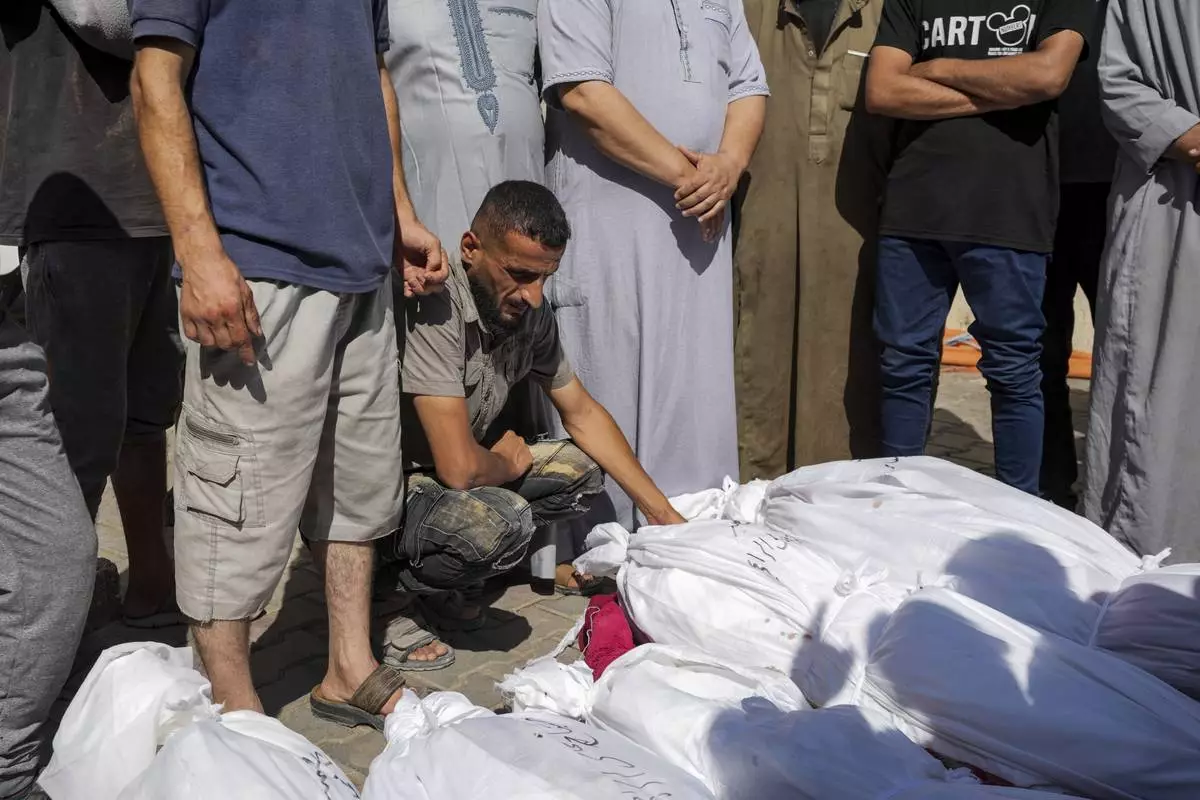
Palestinians mourn their relatives killed in the Israeli bombardment of the Gaza Strip in a hospital in Deir al Balah on Tuesday, June 18, 2024. (AP Photo/Abdel Kareem Hana)

Palestinians mourn their relatives killed in the Israeli bombardment of the Gaza Strip in a hospital in Deir al Balah on Tuesday, June 18, 2024. (AP Photo/Abdel Kareem Hana)

Israeli Prime Minister Benjamin Netanyahu speaks during a ceremony at the Nahalat Yitshak Cemetery in Tel Aviv, Israel, Tuesday, June 18, 2024. The ceremony marked the annual memorial for people killed in Israel’s Altalena affair -- a violent clash between rival Jewish forces that nearly pushed the newly independent Israel into civil war in 1948. (Shaul Golan/Pool Photo via AP)

A Palestinian woman mourns over the body of her nephew, Hamza Al Raei, 11, killed in the Israeli bombardment of the Gaza Strip in a hospital in Deir al Balah on Tuesday, June 18, 2024. (AP Photo/Abdel Kareem Hana)

People wave Israeli flags during a protest against Israeli Prime Minister Benjamin Netanyahu's government and demanding elections outside of the Knesset, Israel's parliament, in Jerusalem, Tuesday, June 18, 2024. (AP Photo/Leo Correa)

People wave Israeli flags and signs during a protest against Israeli Prime Minister Benjamin Netanyahu's government and demanding elections outside of the Knesset, Israel's parliament, in Jerusalem, Tuesday, June 18, 2024. (AP Photo/Leo Correa)

Israeli Prime Minister Benjamin Netanyahu speaks during a ceremony at the Nahalat Yitshak Cemetery in Tel Aviv, Israel, Tuesday, June 18, 2024. The ceremony marked the annual memorial for people killed in Israel’s Altalena affair -- a violent clash between rival Jewish forces that nearly pushed the newly independent Israel into civil war in 1948. (Shaul Golan/Pool Photo via AP)
Members of the Sackler family who own OxyContin maker Purdue Pharma have been cast as prime villains in the U.S. opioid epidemic.
The Supreme Court on Thursday rejected a deal for the company to settle thousands of lawsuits over the toll of opioids through bankruptcy court. The deal was to be financed largely through the company being converted to a public benefits corporation, with profits being used to fight the opioid crisis, and the owners kicking in up to $6 billion for the same purpose.
But in a 5-4 ruling, the court rejected the plan because it would have extended protection from civil lawsuits to company owners who didn't seek bankruptcy protection themselves — and not all the parties agreed to that.
Here's a look at the family, the Stamford, Connecticut-based company the overdose crisis:
Deaths from opioids started rising in the years after the powerful prescription painkiller debuted in 1996.
The drug was marketed to doctors as having a low risk of addiction.
Deaths linked to prescription opioids, including OxyContin, which came in high dosages and in its original formulation was easily crushed to make it even stronger, rose rapidly until 2011 — when more controls were put on prescriptions and there were more crackdowns on illegal sales — and have fluctuated since then. When those leveled off, deaths from heroin started to skyrocket. And as heroin fatalities dropped in the late 2010s, there were a growing number of deaths linked to fentanyl and other potent, illicit, lab-produced opioids.
The number of U.S. overdose deaths from all drugs dropped last year for just the second time in three decades, according to provisional data.
Still, overdose deaths remain near a record high. The 2023 total is projected to be above 107,000, with about three-quarters of those involving opioids.
About twice as many people in the U.S. are now dying each year from opioid overdoses as from car crashes.
Three physician brothers — Arthur, Mortimer and Raymond Sackler — bought the drug company known as Purdue Frederick in 1952. Arthur, the oldest, was a pioneer of marketing drugs, including Valium, to doctors. His descendants sold their share of the company after his death in 1987, years before OxyContin hit the market.
The other brothers and their heirs continued to hold seats on the company's board until the last of them resigned in 2019, ahead of efforts to settle the thousands of lawsuits the company was facing claiming the company was deceiving doctors and the public about the risks of OxyContin. They are still the owners, though they have not received profits in years.
Documents made public as part of lawsuits showed that family members pushed for more sales of OxyContin, which ultimately made them billions.
At the time of the drug's 1996 launch, Richard Sackler, a son of Raymond who was then a Purdue executive and later became president and board chair, told the company’s sales force at a meeting that there would be “a blizzard of prescriptions that will bury the competition.”
Five years later, as it was apparent that the drug was being misused in some cases, he said in an email that Purdue would have to “hammer on the abusers in every way possible,” calling them “the culprits and the problem.”
The Sacklers have been ranked as one of the country's wealthiest families and have largely kept a low profile. One exception: They contributed millions to cultural and educational institutions and got their names on places including galleries in New York’s Metropolitan Museum of Art, the Louvre in Paris and a school at Tufts University. Many of those places have removed the Sackler name over the last five years.
At a hearing in 2021, Richard Sackler said that he, the family and the company bore no responsibility for the opioid crisis. In the same hearing, a cousin, Mortimer D.A. Sackler, expressed some sympathy, saying, “We’re sorry if a medicine that we put out that was intended to relieve pain caused pain.”
The next year Richard and two other family members appeared remotely for an unusual court hearing in which a woman who lost a son to overdose called them “scum of the earth.”
Beset by the lawsuits, Purdue and its owners took a series of major steps.
By early 2019, the Sackler family members left the board. And by the end of the same year, the company filed for bankruptcy as part of a move to negotiate a settlement of all those suits.
The deal they eventually reached called for family members to contribute up to $6 billion over time — representing around half the family's collective fortune — to fight the crisis, with at least $750 million of that going to individual victims in payments ranging from about $3,500 to $48,000.
The Sacklers would also give up ownership of Purdue, and the company would become known as Knoa Pharma, a business structured for its profits to battle the epidemic.
In exchange, family members would be protected from civil lawsuits.
In 2020 the company pleaded guilty to failing to maintain an effective program to prevent drugs from being diverted to the black market, providing misleading information to the DEA and paying doctors in a speakers program to encourage them to write more prescriptions. The plea was part of a deal with the federal government to settle criminal and civil cases that included $8.3 billion in penalties and forfeitures. But it was to pay only a small fraction — $225 million — so long as it executed the settlement through bankruptcy court.
OxyContin is the best known prescription opioid, but Purdue is hardly alone in producing the drugs and facing lawsuits.
Including Purdue's proposed settlement, there has been more than $50 billion worth of opioid settlements with state, local and Native American tribal governments. The money is intended to be used to combat the crisis.
The companies involved have included drugmakers such as Johnson & Johnson and Teva; distributors including McKesson, Amerisource Bergen and Cardinal Health; and pharmacy chains including Walgreen Co., CVS Health and Walmart.
More recently there have been claims against pharmacy benefit managers such as Express Scripts and Optum Rx. Those companies have denied wrongdoing, and the cases have not yet gone to trial.
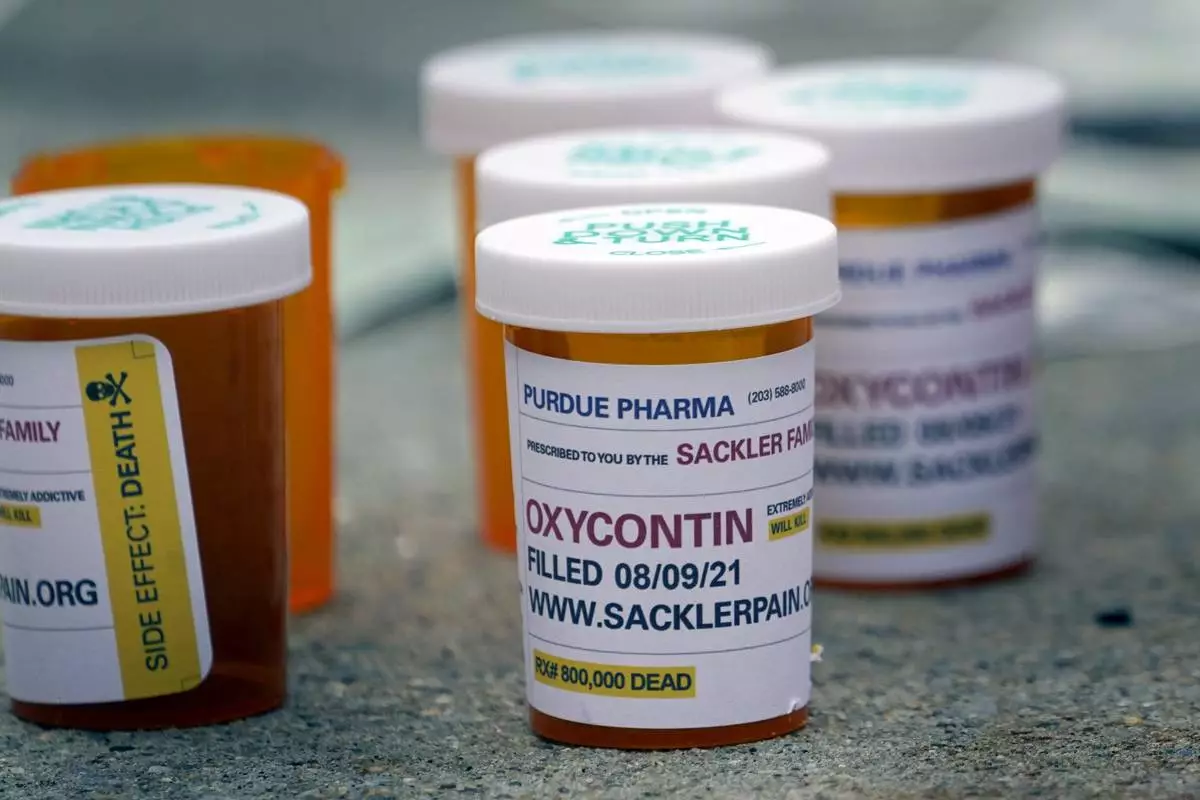
FILE - Fake pill bottles with messages about Purdue Pharma are displayed during a protest outside the courthouse where the bankruptcy of the company is taking place in White Plains, N.Y., Monday, Aug. 9, 2021. The Supreme Court on Thursday, June 27, 2024, rejected a nationwide settlement with OxyContin maker Purdue Pharma that would have shielded members of the Sackler family who own the company from civil lawsuits over the toll of opioids but also would have provided billions of dollars to combat the opioid epidemic. (AP Photo/Seth Wenig, File)
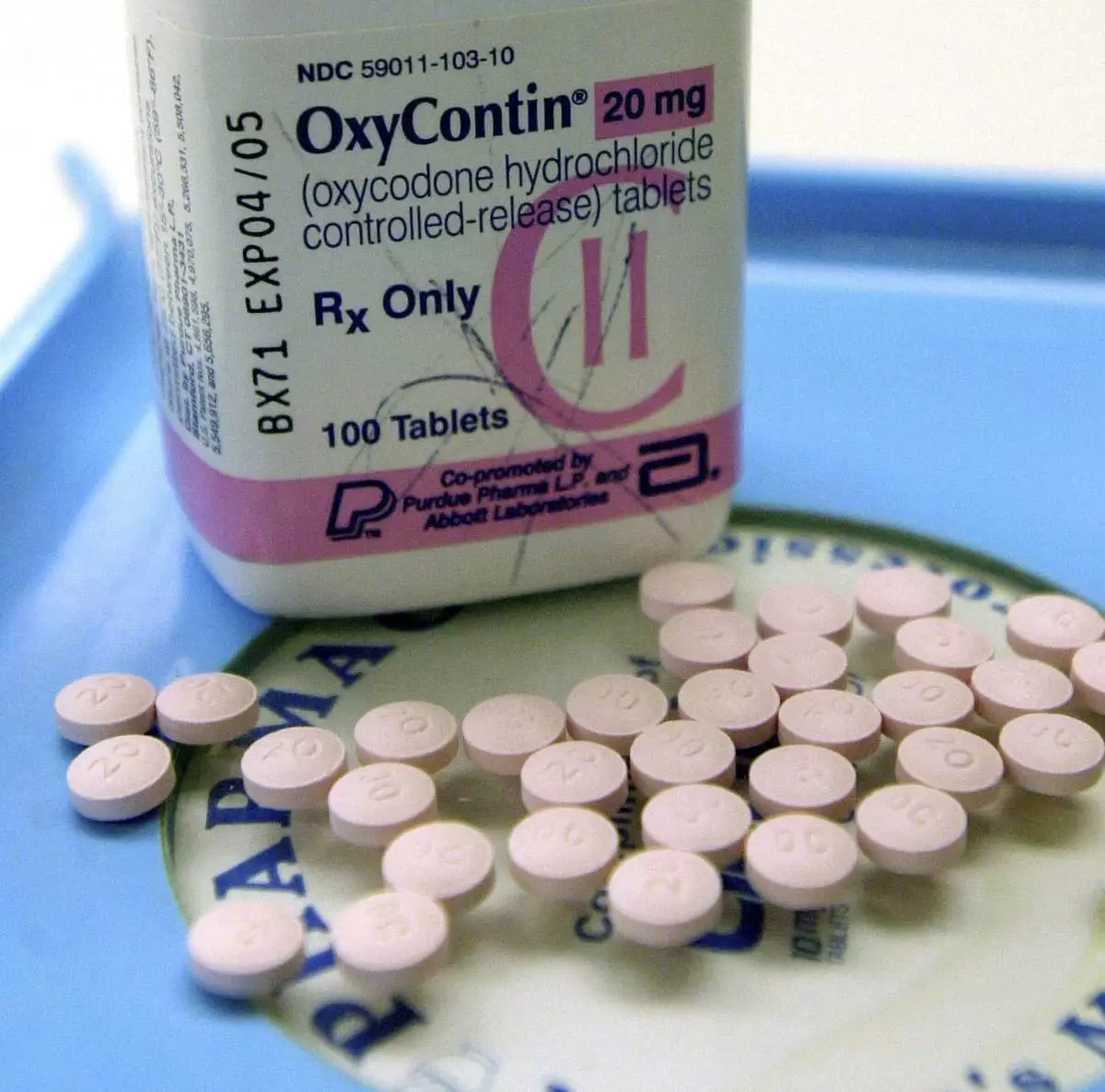
FILE - This July 19, 2001 file photo shows OxyContin tablets at a pharmacy in Montpelier, Vt. The Supreme Court on Thursday, June 27, 2024, rejected a nationwide settlement with OxyContin maker Purdue Pharma that would have shielded members of the Sackler family who own the company from civil lawsuits over the toll of opioids but also would have provided billions of dollars to combat the opioid epidemic. (AP Photo/Toby Talbot, File)
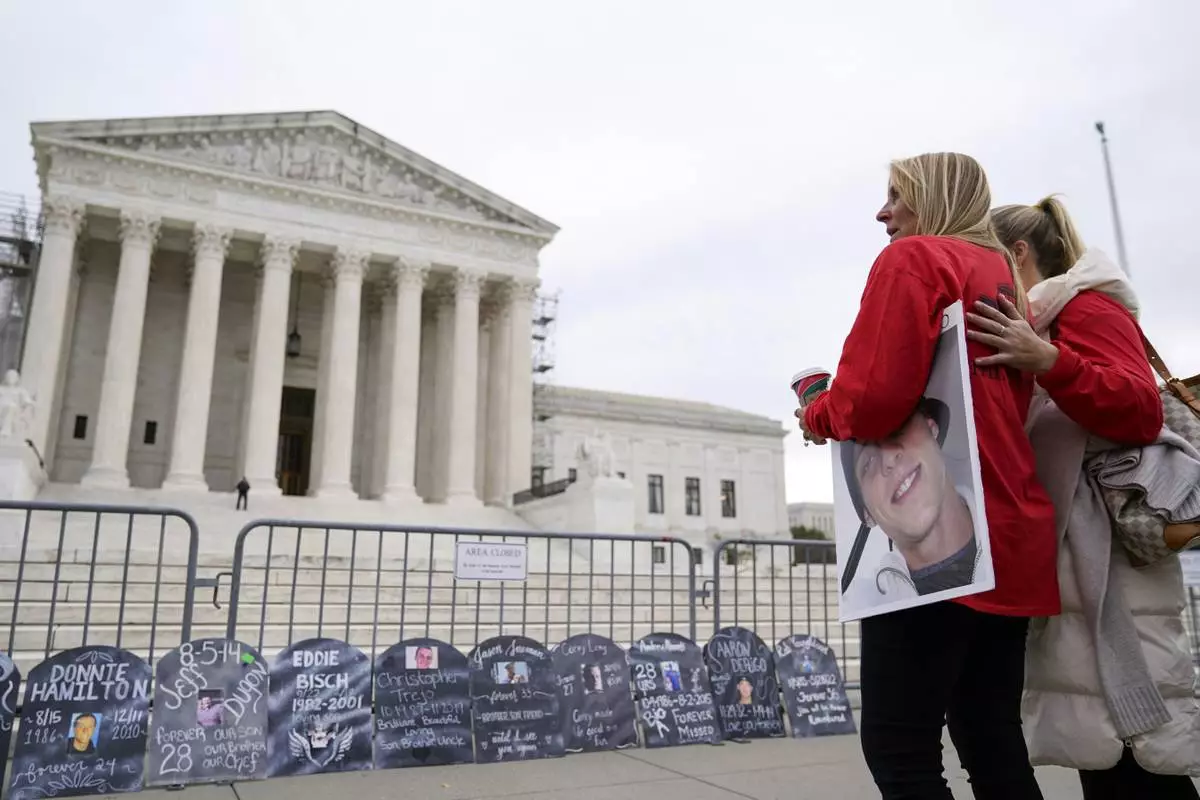
FILE - Jen Trejo holds a photo of her son Christopher as she is comforted outside the Supreme Court where signs in the shape of grave headstones, with information on people who died from using OxyContin, line a security fence, Monday, Dec. 4, 2023, in Washington. The Supreme Court on Thursday, June 27, 2024, rejected a nationwide settlement with OxyContin maker Purdue Pharma that would have shielded members of the Sackler family who own the company from civil lawsuits over the toll of opioids but also would have provided billions of dollars to combat the opioid epidemic. (AP Photo/Stephanie Scarbrough, File)
























